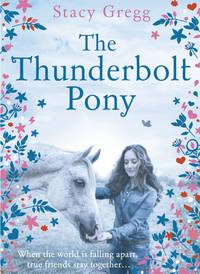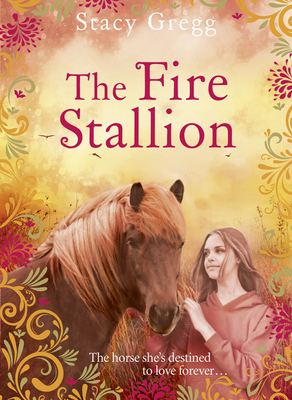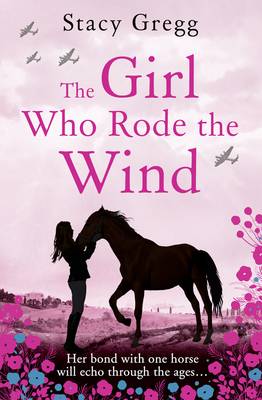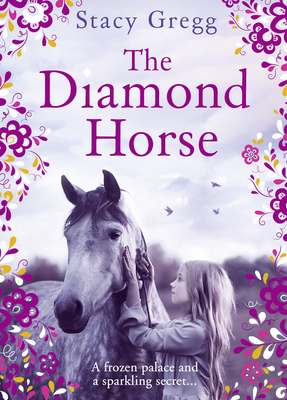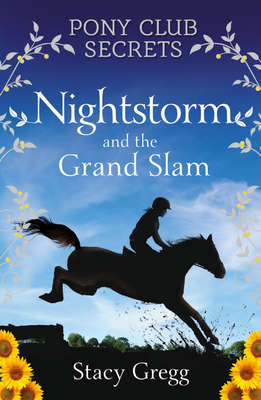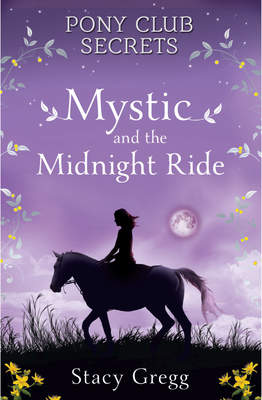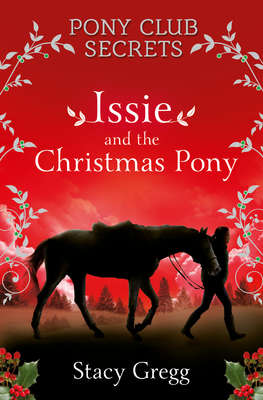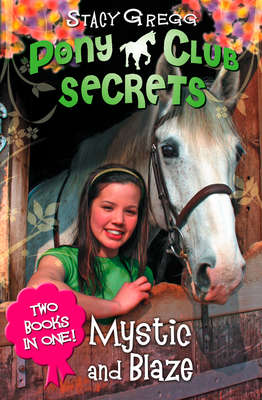Kitabı oku: «The Thunderbolt Pony»


First published in Great Britain by HarperCollins Children’s Books in 2017
HarperCollins Children’s Books is a division of HarperCollinsPublishers Ltd,
HarperCollins Publishers
1 London Bridge Street
London SE1 9GF
The HarperCollins website address is:
Text copyright © Stacy Gregg, 2017
Cover design © HarperCollinsPublishers Ltd 2017
Cover images © Shutterstock.com
Stacy Gregg asserts the moral right to be identified as the author of the work.
A catalogue copy of this book is available from the British Library
All rights reserved under International and Pan-American Copyright Conventions. By payment of the required fees, you have been granted the non-exclusive, non-transferable right to access and read the text of this e-book on screen. No part of this text may be reproduced, transmitted, down-loaded, decompiled, reverse engineered, or stored in or introduced into any information storage and retrieval system, in any form or by any means, whether electronic or mechanical, now known or hereinafter invented, without the express written permission of HarperCollins.
Source ISBN: 9780008257019
Ebook Edition © 2017 ISBN: 9780008257026
Version: 2017-09-05
My heartfelt thanks to clinical psychologist Hilary Mack for his support and advice, and to Suzanne Winterflood, who kept my feet on the ground in this year of earthquakes.
Contents
Cover
Title Page
Copyright
Dedication
Chapter 1: The Bringer
Chapter 2: One Year Ago – How I First Became a Thunder God
Chapter 3: The Minotaur
Chapter 4: The Sacrifices
Chapter 5: Pegasus and Athena
Chapter 6: Seven-Point-Eight
Chapter 7: Moxy and the River Styx
Chapter 8: Trapped
Chapter 9: The Odyssey
Chapter 10: Helen of the Hundalees
Chapter 11: The Riddle of the Sphinx
Chapter 12: Creatures of Poseidon
Chapter 13: The Gates to Tartarus
Chapter 14: Six Legs at Dusk
Chapter 15: Pegasus, Son of the Sea God
Chapter 16: Coming Home
Epilogue – Six Months Later
Keep Reading
Other books by Stacy Gregg
About the Publisher
CHAPTER 1
The Bringer
On the top of Mount Parnassus, in the grand temple where the gods hang out, I am struggling to load my thunderbolts into the two white sacks strapped on to Gus’s back.
“Stand still!” I use a firm tone with my pony as he fidgets. “This is hard enough without you messing about.” The thunderbolts have these sharp, pointy edges that make them almost impossible to stuff into the sack and I’m trying not to jab Gus in the flank, but I’m in a desperate hurry. The white fluffy clouds beneath my feet are trembling. The whole mountain is shaking from the bottom up. There isn’t much time – we need to get out of here.
“Evie!”
A voice booms through the temple and I turn round to see Zeus striding towards me across the clouds, white robes flowing behind him.
“Put the thunderbolts down, Evie.”
I ignore him and continue packing. I can’t stop now and leave the job half done. That would drive me mad. Two thunderbolts absolutely must go in each sack. Two plus two. An even number. I must get the ritual right, do it in sequence, or terrible things will happen. But then terrible things are already happening. The ground thunder is coming. I can feel its rumble beneath my feet, unstoppable and uncontrollable.
“Evie –” Zeus is beside me – “I want you to tell me how much anxiety you would feel, on a scale of one to ten, if you stopped doing this right now?”
His voice is soft, reassuring, and suddenly I realise that beneath his big white fluffy beard Zeus is not a Greek god at all but actually Willard Fox, my psychologist.
“Evie,” Willard says, “this is the OCD trying to trick you. I know you want to make everyone safe, but you cannot control what is to come. There are things in the universe beyond your powers …”
I feel tears prick my eyes when he says this. I want to stop the rituals. I don’t want to be OCD’s slave any more, but I’m so scared. And the earthquake is here now. The shaking that has been rocking the mountain is growing stronger and the air around us turns electric as the thunder rolls under our feet.
Laden with his pannier bags full of thunderbolts, Gus has been getting more and more agitated and suddenly, with a panic-stricken jerk, he wrenches free of my grasp. I lunge at his reins.
“Gus!”
He gallops off and I break into a run, chasing after him, but then the clouds disintegrate beneath my feet and suddenly I am wheeling through the sky. It’s like falling from a plane. Air rushes by me with incredible speed. I look down and I can see Parnassus far below. Not Parnassus the Greek mountain, but my own Parnassus. The small South Island town in New Zealand where I have lived for all twelve years of my life. Parnassus looks very different from above. I can see the rust-red rooftop of the town hall, and the dairy, and Wrightsons farm supplies, and along from the shops is my school, five classrooms set out in a horseshoe, and the chestnut trees bordering the green expanse of the playing fields. The main street looms up towards me as I plummet headlong. Even as I’m falling, in my death plunge I get this sense of wonder, because there’s something cool about seeing the town from above. It all looks so tiny, but then Parnassus is pretty weeny. Mum says the tourists blink and miss it when they drive through on the way to watch the whales in Kaikoura, further up the main state highway where the road hugs the coastline of the Southern Ocean.
I can see our farm as I free-fall. The big oak marking out the lawn beside our villa with its green roof and the driveway to the stable block and the steel grey of the milking sheds. It must be almost milking time because the cows are coming in, moving slowly down the track to the shed as Jock, my Border collie, runs behind them. He’s barking his head off and the noise of his bark is almost as loud as the rumble of the earth, and even though I am in mid-air I can still feel everything shaking. The green fields are coming towards me super-fast now and I brace myself. I take a deep breath and prepare for the fact that I’m about to crash-land head first into the ground …
And then, with a jolt and a heave, I wake up.
I’m surrounded by pitch black. Something heavy is crushing my ribs and pinning me down, and beneath me the ground is bucking and rumbling with a noise like a train.
It feels so raw and so close this time in the darkness, lying here on the ground in a pup tent, with nothing between me and the rolling, turbulent earth. It was different in the first quake two days ago. I was asleep that time too and the quake threw me clean out of bed. I remember grabbing my backpack and me and Jock running for our lives as the house collapsed and feeling the cold jolt of realisation that Mum wasn’t with us, then turning back and seeing her lying on the lawn, not moving. That was the quake that destroyed Parnassus and started all of this. The evacuation and my mum being taken away in the rescue helicopter, the others taking the inland road to meet the rescue ship at Kaikoura.
They all wanted me to go with them, but I couldn’t. I had to make my own way. I chant the names in my head: Parnassus, Hawkswood, Ferniehurst, Hundalee, the Stag and Spey, Kaikoura. This is our journey. Me and Gus and Moxy and Jock …
“Jock?”
The heavy weight that’s been squashing my ribs gives a whimper and I realise it’s him on top of me.
As he struggles to stand up, he shoves his paws deep into the soft bit of my stomach. I give a squeal as his claws dig into my flesh, but before I can push him off me the ground gives another hard buck that throws both of us flat. The impact leaves me winded and I can’t get any breath into my lungs. I begin to hyperventilate and it’s like I’m going to die from not breathing and the more I think about dying the more I can’t breathe and I begin to make these choking, gasping cries.
You want to know where I am right now on a scale of one to ten, Willard? I am a million!
And then the ground stops. I lie there, panting like a dog and shaking. My heart is hammering in my chest and I still can’t get any air into my lungs. I’m gulping, trying to make my breath work again. And then my hot skin goes goosebumpy as I feel something cold and hard against my thigh. Torch! I grab for it and as soon as I have it in my hand I flick the switch and suddenly the tiny black space of my pup tent is illuminated. The first thing I see is Jock’s eyes shining back at me in the light and I nearly scream at the sight of him because he looks deranged, all wild and wolfish with his hackles raised. He gives this low, panic-stricken growl, and at the same time another sound choruses in, an awful howling noise like a baby bawling. It’s Moxy. She must still be in here somewhere, but even with the torchlight on I can’t find her.
“Moxy!” I begin to burrow through the bunched-up folds of sleeping bag.
“Moxy?”
Moxy has worked herself head first into the bottom of my sleeping bag. I worry that she’s dug herself in so deep she’s going to suffocate, but when I try to pick her up she hisses and lashes out with a paw, swiping viciously at me. I take her seriously since I still have scars on my arm from the last time. I leave her alone and unzip the tent and squirm out of the flap with Jock behind me and then zip Moxy in. I don’t want her to escape and get lost.
Outside the tent the night is totally black. There’s not a flicker of light, no houses for miles in any direction. Parnassus is not exactly bright-city-lights, but the hills of Hawkswood are really remote. This is the middle of nowhere and it’s just me and my cat and my dog. And somewhere, out there in the dense black nothing that surrounds us now, is my horse.
When the big earthquake, the seven-point-eight, shook me out of bed in Parnassus, there was a full moon to see by. Tonight the moon is clouded, the stars seem faint and distant, and the beam of my torch is gutless, so I can’t see more than a couple of metres in any direction. For all I know, the earthquake might have destroyed the land all around me. Maybe everything has slid away and right now I’m perched on a cliff edge. I shine the torch beam as far as it can go and stand rooted to the spot. I turn slowly round, trying to find the tree that I tethered Gus to before I went to bed.
“Gus?”
No answer. I keep circling with my torch beam and then I see the tree. The torch beam wobbles as I search for him.
“Gus!”
My heart sinks. There’s the branch where I tied his rope off, and the rope too, but I can’t see him.
My eyes blur with hot tears. I’m having trouble breathing again.
The rope is frayed at the end where he strained and broke free. I feel bad when I think about how terrified he must have been to destroy the rope. But of course he was afraid. I had Jock and Moxy with me when the quake struck. Gus had no one.
This is the second time that Gus has been alone when the quakes rolled. The first time was the big one, back in Parnassus. Was it really only two days ago? It feels like a lifetime ago now. When Mum was about to be airlifted to hospital in the helicopter, she told me that Gus would be fine on his own. But she never saw how he was after the first quake struck, the pure terror in him. He’ll be feeling that same fear again right now, and once again I’ve let him down because I wasn’t with him.
I should have slept with him. Like a Bedouin nomad who brings his horse into his tent to sleep right beside him for safety. That’s what I should have done with Gus.
He’s an Arab – you’d know that straight away if you saw him, with that delicate dapple-grey coat and skinny ballerina legs and his pretty dished face. I should have taken him inside my tent, except it’s only a pup tent and it’s way too small. It could barely fit me and the dog and cat. So why didn’t I sleep outside under the tree with him? We should never have been apart. This is all my fault. Who leaves their best friend alone like that?
I shine the torch around again, like I still expect Gus to magically appear beneath the tree. Then I walk back to the tent with Jock hugging so close to me he’s almost wrapped round my thigh. Working dogs usually stick close, but Jock is like glue and I know he’s worried that we’re going to lose each other too.
“Good boy,” I reassure him with a pat on his head, and then I bend down and unzip the tent very carefully, making the smallest gap possible to let us both back in and at the same time make sure Moxy won’t bolt out. We’ve been through enough in the past few days and I don’t want to lose her again. I want to look for Gus, but first there’s something I need to do. I can see Willard Fox at this moment looking down from the clouds still dressed as Zeus with his beard and everything, frowning as he tells me that OCD is a war. “In a war, Evie, you can’t win every battle. Sometimes you have to accept a loss or two. But you can still win the war.”
On a night like this, my OCD is too hard to fight. And so I give in to the urges, and once Jock and I are back inside the tent and all zipped up, I begin the rituals.
I pick up my backpack and undo the side pocket. Then I do up the zip and then I unzip it again. Unzip-zip-unzip and already I feel a lot better. My heart isn’t pounding so hard in my chest any more, but my hands are still shaking as I take the contents out of the pocket and lay them in front of me in the torchlight. There are four items: a gold pen that writes with blue ink, an old takeaway container, a pair of glasses and a pocket notebook.
Somewhere out there in the dark, Gus is lost and I need to find him. But I can’t go yet. I want desperately to go and search for my pony, but the rituals override logic and compel me to continue.
I line up the objects like precious artefacts in a museum. I check them and rearrange their position and then I stack them back in the pocket of my bag in precisely the right formation and I zip it up again. I do this twice over, and then I am done. My heartbeat slows further. I can breathe now. The air goes in and out and there’s a lightness in my chest. I am ready.
When I emerge from the tent this time, I have my backpack on and I feel better because I’ve done things right. All the same, I feel like it still might not be enough protection. And I know I should have done more last night before I went to bed.
If I’d done the rituals better then maybe this earthquake wouldn’t have come.
If Willard Fox was here right now, he’d tell me that my rituals are not going to change the world … that they wouldn’t stop an earthquake. I am not responsible for saving the fate of others or even myself. “Evie,” he’d say, “do you really think a twelve-year-old girl can unleash catastrophe? That you are capable of killing everyone you love and care about, including Jock and Moxy and Gus? Because if you can do this, Evie, then I’m pretty sure that one of those super-secret spy agencies like the CIA would have got in touch with you by now. They could use someone like you. Powers of mass destruction. They’d want to harness that, right?”
The way he says it, it isn’t cruel or sarcastic. He’s not mocking my abilities. Willard is truly asking me the question. Do I really in my heart believe it’s because of me? Am I the one responsible for all of this?
Sometimes I believe him and I know it’s not real. Other times, like right now, I lose faith, I fall back on the rituals.
I know I could have done them better. But it’s been hard because I’m not at home any more. I’m in a tent, camping out, with no one around to help me and everything keeps changing. I am trying to do it right but I know I’ve been failing.
The gods of Parnassus up high on those fluffy clouds are watching me and they see it. They know it’s all my fault. That is the burden of my powers, and if Willard was to ask me right now at this very moment if I caused all of this I would tell him the truth and say, Yes, yes of course it’s me. It’s always been me.
My name is Evie Violet Van Zwanenberg and I am the harbinger of a power so dark that, if I cannot control it, I will destroy the world. I am no ordinary twelve-year-old girl. I have thunderbolts in my fingertips and lightning in my veins. I am the end of days. I am the bringer of earthquakes.
CHAPTER 2
One Year Ago – How I First Became a Thunder God
I walk the blue line with Mum beside me in the hospital. It traces our path on the linoleum floor past A&E where feverish, pale children sit quietly beside their anxious mothers. Past the x-ray rooms where they plaster the bones broken in trampoline accidents. Then through the double doors and we are on the main ward, and as I walk I cast my gaze through an open curtain and I see a girl about my age lying asleep in her bed with tubes in her arm and in her nose, and I think, “Poor kid, she looks sick.”
That’s the thing. I don’t think of myself as being like her. But I’m in hospital, aren’t I? There is something wrong with me. You just can’t see it.
We keep walking through another set of double doors, still following that blue line, and now we are in a reception area and the sign on the wall by the desk is printed in clear black type on white: Adolescent Mental Health.
Mum approaches the nurse. “I have Evie Van Zwanenberg here for her ten am appointment with Willard Fox.”
I don’t like it here. “Hospital” is supposed to be where you go to get made better, but to me it’s a place where people go to die.
I’m in the same building now where my dad used to be. Only to get to his ward we used to follow a different line, a red one. It would take us through from the car park and the heavy double doors along the lower corridors to the lifts.
I remember the first time I came with Mum to see him after they’d moved him on to the ward. Mum led me through the corridors along that red line until we reached the lifts and we stepped inside this massive metal chamber and she pressed the button for Level 8, and I looked at the word on the sign on the wall and sounded it out in my head and I asked her, “What’s oncology?”
I know what it means now. Oncology is another word for cancer. That’s what they found in my dad’s spine when he went to see the doctor about the back pain he kept getting when he was milking the cows.
Even when I knew the word, I didn’t really know what it meant. Looking back now, I feel unbelievably stupid because I had actually found it fun making those family trips from Parnassus to Christchurch each week. Mum and I would drop Dad at the hospital and then we’d go for lunch in Container City – which is the part of town where they have made all the shops out of these big shipping containers. They did it as a temporary thing because all the buildings were destroyed in the earthquake seven years ago, but then it remained and I kind of like it the way it is now. There’s a really good noodle bar in Container City so usually we’d have noodles and mostly we’d get takeaway noodles for Dad too for later.
Things changed once he was on the ward and he didn’t get to go home. We’d still get him noodles but he never, ever wanted to eat them. He wasn’t hungry because of the medication he was on. Mum kept buying them anyway, even though he’d just leave them sitting there going cold beside his bed. By then the cancer had metastasised. That was another word I didn’t know. It meant it had spread, travelling from his spine to his liver and his brain. Me-tas-ta-sised – that word sucked all the air out of the room when they told Mum. She couldn’t look at me as we walked back to the car without Dad that day.
I remember how, when she unlocked the car, she kind of crumpled over for a minute and didn’t get in. I had this lump in my throat that wouldn’t go away, and when I opened my door and sat down in my seat for some reason it seemed like the right thing to do to shut my door not once but twice. Then I did the same to my seat belt, buckling and unbuckling, doing it up twice too – click-undo-click.
Looking back, I can’t tell you why, but from that moment on the way home from the hospital when I double-shut that car door, that was when it began. I did the same thing when I got out of the car at home. I shut the door and then opened it and shut it again. I thought Mum would ask me what I was doing, but she didn’t even notice. I guess she had other things on her mind. Anyway, from then on it wasn’t that I wanted to do it. I had to do it.
Mum didn’t notice at home either when I shut my bedroom door twice. In the morning she told me off because I’d left my bedroom light on all night and I said I’d fallen asleep but really it was because when I went to switch off the light, I had this urge for making things even, just like the car door, and I found it impossible to only press the switch once so I had to switch the lights back on again, and off and on again to make it even, and then the lights were still on and so I slept with the lights glowing and my head buried in Moxy’s fur.
Every time from then on, when I got in the car or entered my bedroom, I completed that double door slam and on the second swing as the lock clicked shut I felt this incredible release. It was like a rush to my brain, this surge of energy that felt solid and real, and in that perfect moment I knew that somehow my actions were making everyone that I loved – Dad and Mum and Gus and Jock and Moxy – safe.
Double-slam, double-slam. I didn’t realise that pretty soon the urge for release would become my prison. That when I tried to stop doing things twice it would throw me into an anxiety attack that made me feel like a swarm of bees was invading my brain, the buzzing inside my head making me want to scream and curl up in a ball and disappear forever.
As the rituals took hold of me over the coming months, I desperately wanted to tell Mum what was happening to me. I mean, I was so scared of my own mind, I really thought I was going crazy. But what if I was crazy? And what if Mum found out I was having all these weird thoughts and she stopped loving me? You know, they have mental hospitals where they lock up kids like me – I’ve seen it in movies.
The more I thought about telling Mum, the more afraid I got. And the more I double-slammed those doors.
I couldn’t tell Moana either, even though we were best friends at school. I told Moana once about how I’d wet the bed on school camp and she told Juanita Wanakore and she teased me about it all term. If I was going to tell someone, I had to know I could trust them to never tell another soul.
I remember when I told Gus, he just held me with his eyes. I sat on the five-bar gate and I stroked his neck as I spoke and I told him everything. I knew he was really listening because the whole time his ears swivelled back and forth and his dark, liquid brown eyes were soft and sad and sometimes he wrinkled his muzzle. And as we sat there together, I very carefully did two tiny braids into his mane at the base of his neck by the wither. And that was when I knew that Gus was a part of my OCD too, and that I needed to do these two braids to make sure that Gus was safe. They would protect him, and even Jock and Moxy too.
When I first got Gus, he came from a farm where he was in a big herd of horses. I thought maybe he’d miss having a herd, but when he came to live in Parnassus, it was like me and Jock and Moxy became his herd. With Gus and Jock, they have this real respectful relationship. Like, when we go for rides across the farm, Jock will always fall in at Gus’s heels and keep in time with his strides. Border collies are smart like that and Jock is super well-trained. He used to be a working dog until he got too old, and I can give him instructions and he does whatever I tell him.
Moxy is the wild one of the group – she always runs ahead, being our trailblazer, sniffing and scouting the way. She’s intrepid for a cat. It’s in her breeding. Cornish Rex are real explorers. If you don’t know what they look like, well, they are almost bald because they have this crinkled-up fur like they’ve been shaved and the skin stretches taut so you can see the bones of her skull through it and she’s super-skinny with a long, ropey tail like a rat. I’m not making her sound very beautiful and I guess she’s not, but she is kind of amazing-looking, like the sort of pet an Egyptian princess would own.
We paid almost a thousand dollars for Moxy, and Dad was furious when he found out because he said he could buy a good working dog for that and you can get kittens for free around here because people are always giving them away. You shouldn’t have to pay for them. But Mum said Cornish Rex weren’t like ordinary cats – they were explorers, more like dogs than cats in their way, and loyal like a dog is loyal, choosing just one master. Also she knew this lady in Christchurch who was a “cat fancier” who bred them and did us a cheap deal. She was a really odd woman – she kept her cats in cages and washed them in special shampoo and wouldn’t let you play with them and when you went round to her house it smelt of cat poo and all her furniture was covered in plastic.
Dad soon changed his mind about paying for a fancy cat once Moxy chalked up the highest kill rate of any ratter we’ve ever had. She’s an amazing huntress. And she eats the rats too. Lots of cats will eat mice but not rats because rats taste gross, I guess, but Moxy swallows them down – she crunches up everything except for the fangs at the front and the tail at the back.
Moxy is supposed to be my cat, but if she’s loyal to anyone it’s Gus. She thinks she belongs to him. Or maybe it’s the other way round and she thinks Gus is her horse. If I’m looking for her then I’ll find her out there in the paddock with him, curled up on top of his rump, purring contentedly.
Gus was the only one I told about my OCD for a long time. In fact, I never would have told Mum at all. I was going to keep it a secret forever. The problem was, the OCD got worse. It got so bad I began to lie about stuff. Like, I would pretend to be sick and just stay in bed all day because I figured if I didn’t move, if I did nothing at all, then I didn’t need to do any of my rituals and I wouldn’t have to try to fight the urges inside me.
Only Mum wouldn’t leave me alone. She kept insisting that if I wasn’t actually sick, I needed to go to school and do my chores. But the OCD made it impossible because I’d developed this complex world of chaos in my bedroom. It looked like a big mess, but it was all part of my plan and I’d lie in the middle of the floor like a statue with the lights as bright as heaven above, unable to switch them off and trying not to think as the bees made my head fuzzy.
One morning Mum came into my room. I’d had the lights on all night and when she left my door open and touched the light switch I started shouting. It all suddenly burst out of me like pus from a swollen wound.
“Mum!” I began sobbing. “There’s something wrong with me!”
It was Mum who looked up my symptoms on the internet and discovered I was OCD. The initials stand for Obsessive Compulsive Disorder.
“Evie,” she said, “it’s going to be OK. We’ll find someone who can help.”
That was what led us back to the hospital, following the blue line this time instead of the red. Once a week every Tuesday at four.
We come here, to these familiar corridors with their weird, tainted smell that is a mix of antiseptic and blood, and every time I catch sight of that sign in the lift that says “Level 8: Oncology” I feel the tears well up and I get so mad at myself, and I tell myself not to cry. I tell myself all sorts of things. And I count my footsteps. One-two. Even steps between each floor tile, an even number of buttons that must be pressed when I enter the lift, and two whole glasses of water from the cooler in the waiting room before I enter Willard Fox’s rooms to begin our session.

